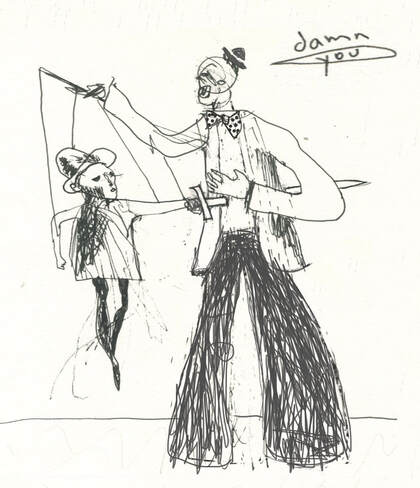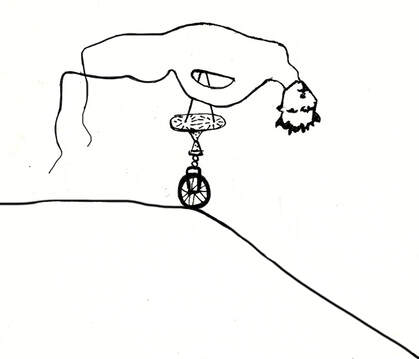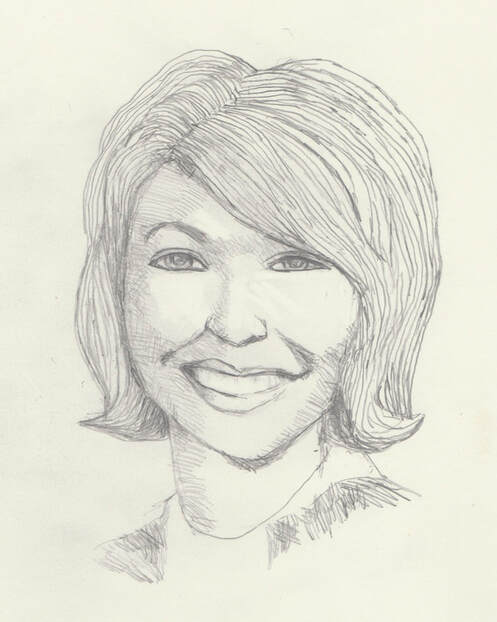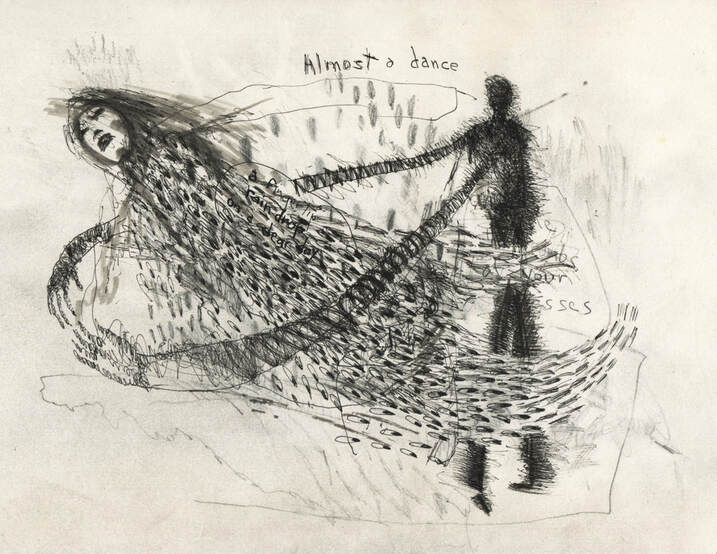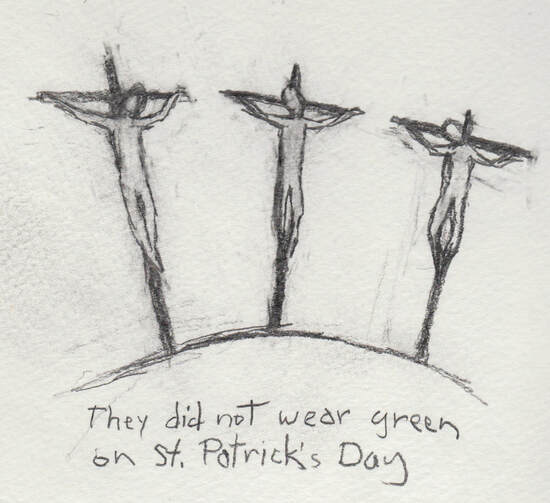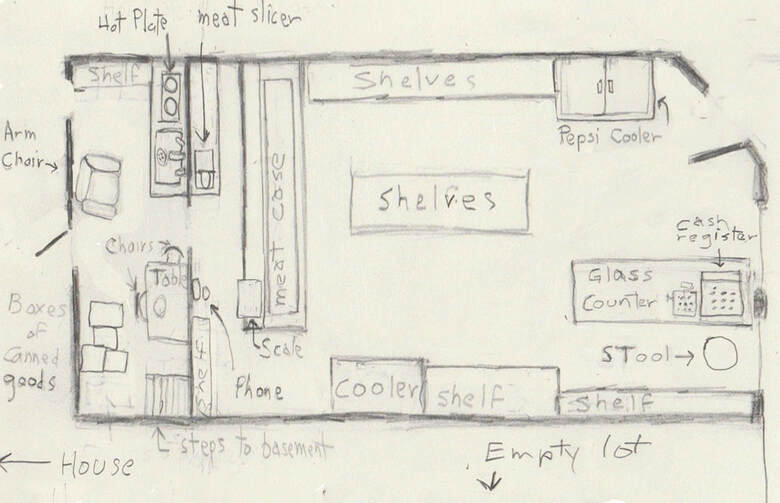Home Schooling
|
During high school I became increasingly more aware of being observed. Curling up like a snail at my desk no longer gave me the sense of invisibility as before. My doodles dwindled away to nothing, dissolved by exposure of my classmates who where viewing everyone with a more critical eye. I had to lay the little bodies down, choke them off, throw them in the grave and move on. They slinked away without much complaint, like an improperly dressed guest at a Met Gala.
I am not even going to try and describe the school years directly following my father's death, only to state that, except for my stunted physical abilities, activities with fellow seventh and eighth grade students were full of fun. The first spring after the funeral, which I have no memory of by the way-- if I squeeze my head hard I can almost see my father in the casket, but that's it-- that very spring I was signed up for the Boy Scouts by a caring somebody. The Boy Scout troop was nicknamed the "poor boy's troup" by the "rich boy's troop" - nicknamed by us. The scout master was a bachelor named, Jack Proper, who still lived with his mother and behaved with us in a manner true to his name, as far as I know. The experience was so wonderful and joyous I wrote a whole story about it. However it is a first draft and could take many frustrating weeks to make it readable. Because I feel rushed just to finish the basic outline of my visual journey I am not going to include it and instead skip to molding influences of my high school years. Before even entering high school the girls suddenly became insanely desirable creating an emotional turmoil that has lasted pretty much my entire life. There is nothing about those kind of experiences that have not been continuously explored since the early writings on the ancient Sumerian clay tablets. No need to add another neurotic page. All I can say is that my mother, who I have such warm feelings for, was the the quietest, most gentle person imaginable and the "only" woman in my life and the "only" life experience I could draw from as I tried to enter into vast turmoil of sexual intermingling. In my forties I decided I would have been better off if my mother had been a raving run-off-at-the-mouth lunatic who left no aspect of being a woman vocally unexplored. Other highlights that laid the ground work for my life for the years to come begin with the chain link basketball nets welded onto the rims of the hoops in the park behind David Bunnell's house. Not the flimsy chain link basket ball nets seen on public playgrounds but heavy chain that sent off a soothing deep sound like a crashing ocean wave as the ball went through the hoop. I have never seen anything similar on any playground since and I still long to hear that satisfying auditory accent to a well placed shot. Dave and I played for hours on those courts and continued playing each other one-on-one on multiple courts in multiple towns throughout our life. We broke sweat together and became like brothers, sweat brothers. David was the first person to strike up a friendship with me in sixth grade shortly after my return to school. He may have been encouraged by his father, Hugh, the editor of the Alliance Time-Herald newspaper who used to drop by and talk to my father shortly after the Corner Grocery opened. Hugh continued his daily visits after my father was confined to the house and my mother ran the store. Certainly, Hugh knew about me, probably walked by the house everyday on his way home wondering what was happening to that boy inside, the same age as his own son. He undoubtably told his son, David, what was happening and probably even encouraged him to reach out to me after my return to class. David had a dynamic personality and I considered him my superior in all things physical and mental. His father, being the editor of the local paper knew everyone in town and those who either ran or were victims of local politics. Likewise, David was also aware and often outraged by a social structure that was invisible to me. Thanks to his father, who had been a correspondent during WW II, he had a much broader intellectual range than I did. By the time he was in high school he was writing human interest articles and sports reports for the Times-Herald. He was also very physically competitive making it on the high school basketball team even though he was a little shorter than me, about five foot six. While playing tennis, he told me, he considered his racket a club he used to beat his opponent into submission. His drive made him the fastest long distant runner in the state, his kick so high the heel of his shoe would hit his butt on each stride. I did not question his friendship with me back then, it just happened naturally without the why. I had multiple friends, mostly boys, during that time. but it was David that allowed me to be a pathetic, whiney little basket case in his presence. I did not suffer alone. High school was the age where I could no longer just be someone hunched in a corner. I had to become someone that could fit into the classmate puzzle of identities. By default, I was labeled an artist in spite of having never put anything in a frame or taped anything to a wall. Any drafting skills learned from constant doodling were so meager that I was barely qualified to be an artist. What I did have is the correct posture, hunched over and scratching away in the margins of note books. All that was needed was too slide a real sketchbook under my agitated pencil. Other than that, my situation was pretty hopeless. There was no room for paintings in the Conestoga wagons during the migration west and no need for art classes in a pioneer town. I would have to fend for myself. |
|
Life magazine featured current living artists every few months and from there I had learned about Picasso, Miro, Giacometti and others. Although the only effect the photo's had on me was the realization that artists could be famous and have very nice studios in exotic places. Their artwork did not tickle anything inside me. What I was attracted to instead was the realism I saw in the illustrations for advertising, or portraits on album covers and paintings in books like the Bible. I began training my free range roaming hand to adhere to the discipline required to produce a likeness. My first real attempt was to make a drawing of the teen idol, Bobby Rydell, for reasons Freud himself would not be able to discover. I spent hours and hours trying g to nudge eyes, lips and nose into a recognizable position with disappointing results. The lure of realism still drags me into rabbit holes, the desire to achieve it so thick I almost salivate thinking about the challenge. This is a residue of western culture it seems. Western art invented trompe l oeil, paintings whose realism fools the eye such the "birds try to peck the fruit off the canvas". The art of other societies do not seem to be drawn to such realism but it seems to be in my blood right next to lust. I am just too lazy to be good at it.
Artist's styles and capabilities are frozen solid as molten metal after being cooled in a mold. Even Picasso is always recognizable as Picasso, but, within that frozen realm of self is a craftsmanship that can be trained. The muscle memory I had left over from all those years of intuitive sketching was not much use to me as I began my journey to be what I thought an artist should be. Which meant I was starting at the bottom of the hand-eye dexterity ladder. Some painters are blessed with a natural talent that elevates them beyond the boundaries of rote craftsmanship to a level of perfection that is almost saintly. By good fortune I got to work with them painting backdrops for Broadway and the Metropolitan opera. The backdrops were often twenty feet tall and forty feet long laid down on the floor while the painters stood on them with bamboo sticks the lengths of swords. Bamboo stalks are hallow and hard. With one end crushed, the handles of various sized brushes can be stuck in and secured with rubber band making a brush resemble a fencing foil. Brandishing them like the Three Musketeers, the artists thrusted and parried across the canvas with sure strokes, creating with the knife edged dashes and broad strokes of paint almost incomprehensible images up close that magically turned into brass statues, curtains, cathedrals, forests and flowers at a distance. Watching them work was an astounding experience. Joining them on that great expanse of white canvas, was terrifying. My timid strokes felt like a novice surgeon's scalpel making the first cut on a wide awake patient. The flair those painters possessed was unattainable for me. I was fraud compared to them, a stiff paint-by-number artist pretending I could imitate their talent enough to survive on a drop. I did not last long, of course, and was soon put on hard scenery, carpentry built sets, requiring less lofty talents to paint. Most of the drop painters had been painting since college, maybe even high school. Painting first for school plays then summer stock theaters where they worked dawn to midnight painting for room and board and some spending money. Some were second generation drop painters or products of the few Universities, like Yale, or the University of Southern Carolina, where scenic art is taught. The handful of painters in charge of the drops were a breed with an undeniable latent talent. Just working in the same room with them was magical. The charge artist at the Metropolitan Opera welded a bamboo with a four inch brush on the end as easily as waving a blade of grass. Latent talent for painting is something I do not have. I have tried and flair is something I could not achieve. What got me out on the drop was a kind of crass tenacity that prompted the charge painter to give me a shot. However, I just could not see where to put those slashes and broad strokes that floated over, under and through each other in such a way they would mesh together into a photographic resemblance at a distance. As one scenic put it when she saw what I was doing, "Oh Walt Disney", which meant paint-by- number, which meant "flat and lifeless". There is a dynamic watching a Rembrandt morph into a Jackson Pollock while approaching his painting that makes it simmer with life. That is a skill combined with a talented eye, given at birth, that can see. I am blind by comparison, but I tried, tried hard enough to pass the union exam and sneak onto a drop or two. As far as latent talent goes, there is the example of a painter who grew up in South Viet Nam, made sculptures out of wet dirt and had only one incomplete set of colored pencils. His brothers and sisters all drowned trying to escape after the collapse of Saigon. During his escape he had to lay under a bench for days and then run blindly through a swamp to a boat on a beach to spend more time hidden under a bed while storms that killed his siblings threatened him. After spending a year in an interment camp he made it to America and finally joined United Scenic Artists, Local 829--the same union the drop painters and I belonged to. He could paint portraits like John Singer Sargent as easily as skipping down the street. That is a latent talent rising above craft. The whole union is crammed with such talent doing marbleizing, wood graining, sculpting , lettering and multiple other tasks on command. Much of my life of labor was spent in awe of my coworkers. Back in nineteen sixty I had no knowledge of how artists became skilled, made a living or, most especially, have a vision. There was no such vision in my head that I wanted to make manifest. What I did have was posture. All those years hunched over my notebooks had trained my body not to complain when my childhood doodles were replaced by attempts to emulate what I thought was art. Like positioning a GI Joe I could be placed at table and would I automatically move my arm. The arm, by the way has to hover over the paper and execute the most delicate of movements. The entire body has to be braced to maintain the floating wrist and hand in position. The feet have to be pressed firmly against the floor to fight the gravity hauling the arm back down from its flight. Fatigue eventually makes the poor appendage flounder and loose its delicacy. That kind of muscle needs to be strengthened but I had already tuned my body for that kind of challenge. All that was missing was the technique and discipline required to make a work of art that resembled the ones I was trying to copy The problem was the eye to hand coordination required to turn what I saw into what my hand drew, my face squeezing into a fist trying to move my eyes into correct focus. It was beginning of decades of imitation, my only weapon of survival. The same as following the cheerful sixth grade choir as they sang their way down the hospital hallway glowing of health. The notion that a well done portrait could actually cause one of the girls of my dreams to like me was so inspiring that my next endeavor was a drawing of Linda, taken from our sophomore year book. For days I secretly drew, erased, drew erased and started over again. After I finally showed it to her, she seemed delighted. A few days later she asked me why don't I asked her out. I choked out a giggle, the most infantile sound there is, and turned away. I never asked her out and apparently never gave her the drawing either because I recently found the original, as evidenced by the post. |
|
Linda was not the only girl who signaled to me that she would like to be approached, a few others had also, almost throwing themselves at me, at times, right on top of me, but I always froze like Lot's wife looking back at Sodom. I know I am not alone, I have seen enough movies to realize that I am not that far off the spectrum, not the only person to hang from his own hand held rope, to enchase himself inside the mud of self loathing or tremble from anxiety. Most likely I was only a few degrees off kilter but enough to jamb me up completely and forcing me circle the perimeters made by the stronger and more socially adept. Worse, I was not allowing those women interested me a place to dock and perhaps find refuge from their own needs. Feelers were sent out, no doubt about that. Maybe they needed salvation of a soothing relationship the same way I did only to be disappointed when I shrank away, withered like a parched vine retreating back to its barren roots. Doesn't take much to make the record skip, if you know what I mean.
|
|
The only other artist that I knew about in our class was Roger Evens, who could make heads out of clay that looked like classic Greek Sculpture. The heads were remarkably well proportioned and were much admired by the class. Several were used to decorate a school dance that had an Ancient Rome theme. I rarely even talked to him or, more precisely, he never talked to me.
A desirable young woman, not the one I desired the most, but desirable, asked me to draw something for their school newspaper that was planning an article to celebrate St. Patrick's day. The request confused me since I had no visual style that would make someone say, "Hey, let's put a Don Nace drawing in here". Looking back and keeping with the thought that those classmates that knew me and had taken on the role of nurses in a mental institute, the request might have been an effort to unfurl me out of my shell. They gave me a commission, an assignment requiring that I draw on demand. My arms went numb and my fingers turned into limp spaghetti. I know because I reproduced the drawing whose shame had burned the image into my memory. The effort was difficult and profoundly disappointing - even though that was the goal. Fifty years of drawing had not improved my abilities at all. I am surprised they published it. They probably did not want to upset me. Who, knows. Were they being kind and if so was I that pathetic? And, was the drawing really as bad as I remember it, as I redrew it? |
|
Since there were no art classes in High School the only thing displayed in the hallways were sports trophies until Jerry Hatch showed up in my junior year. He brought with him a degree of sophistication that invigorated everyone, including the teachers. Tall, handsome and artistic, it was not long before he had a painting in the hall.
Jerry was mysterious, unconventional and exotic, by my standards anyway. He drove a used Saab for instance, a car I had never heard of with a shape completely uncommon to US standards. The Volkswagen Beetle looked tame by comparison. Beyond that he was a self declared artist. Not a paint-a-flower type of artist but a glue-scraps-of-wood and peaces-of-old-road-signs on a canvas kind of artist. Something none of us would have dreamed of doing back then before the artistic wave of self expression washed over America turning old gas stations into galleries and churches into performance spaces. He was like Marco Polo back from exotic lands with visual spices to delight teachers and students alike, especially the female students. I was in awe. I think my decision to study art came more from him than any passion of my own. Jerry had an intellectual look on life hinting on the absurd that must have came from an environment outside the boundaries of ours. He had a bit of big city sophistication that gave him a height to look down from. Jerry became Davids friend and , by default, mine. Or maybe Jerry and I just became friends. A friend who knew nothing of my history. Perhaps my blank slate had enough writing on it to give me a personality or, more likely, he saw space to write. Seemed like high school was wildness we were all wandering around in with a piece of chalk in our hand looking for someone to hand it to so they can write on our board, or they are looking for someone to write on. As somebody said, "It's a jungle out there". If my life were a cowboy movie or, more appropriately, one of the cowboy TV shows so popular at the time, High School would be considered the "Indian Territory", a term and attitude that has been throughly discredited by subsequent liberal thinking. The Corner Grocery would be the solitary wooden stockade fort I returned to each evening after a day of exploration in the wild territory. My mother worked in that store from seven am to eight pm everyday, including Sunday. The house was largely empty after my father left leaving a space for me to meander in without interruption by any living person's aura. Such freedom gave me space to rage. The episodes usually took place in the mornings after my mother had left to open the store, leaving me to arouse myself and prepare for school. For a period of time the rages were rituals performed each morning. I could scream and curse at the highest volume, jump up and down in a frenzy, coiling up and springing my legs down after each jump so hard dishes bounced on the table, tears and spittle fogging together in a mist around me. Ten seconds, maybe fifteen was all it took to wring the devil out of me. A few deep breaths later I could dress and walk across the dry crispy lawn to the store and eat breakfast. |
|
By the time my mother's sister Maggie took over her destiny my mother had given up having any control of her life. If anyone had the mannerisms of a lifer in prison suddenly released on parole it was her. The main priorities being, make yourself as unthreatening as possible and always check in with your parole officer. Inside the store, however, she was relaxed and confident. Instead of being forced out into the world, the world came in to her through the screen door with the faded Pepsi sign above it. She conducted most interactions on the raised platform behind the protection of the long glass counter with countenance of a judge. There she took money or added up the charges of the items in small ledgers to be paid later, a separate book for each customer with their name on the top kept in a cardboard box on the shelf behind the counter. All those conversations had a purpose unrelated to her and any casual talk that took place was buttressed by the confidence given by the importance of being a store owner. Those years in the store could be judged as her best. It was our home for six years. I ate breakfast, lunch and dinner there. Dave even ate lunch there upon occasion sitting at the little table. After school I swept up, stocked she shelves and waited on on the numerous kids invading the store for their afternoon candy. Standing on the platform watching the kids agonize over the rows of choices in the glass counter was a great feeling, however, counting out change to adults was the best. The old pillowy lounge chair was wide enough for me to curl up in and use the arm as a desk to do homework on. After dinner I would go to the house and watch television. My mother came home around eight thirty to wash up and do minor household maintenance before going to sleep. Shortly after the funeral she had asked me to sleep in bed with her because the loneliness was most painful at bedtime. She lay in her usual spot and I positioned myself in the depression made by my father. The arrangement only lasted a short while before she felt better and I moved back to the cot in the kitchen.
|
